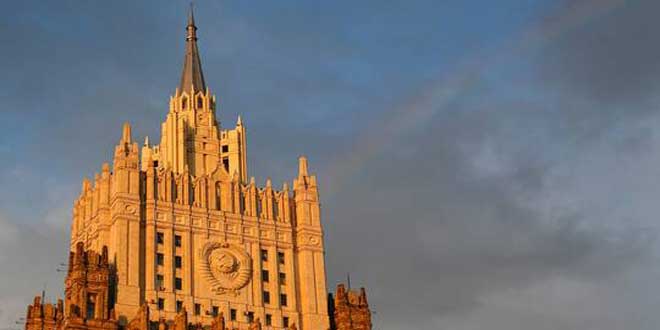MOSCOW, May 5. /TASS/. Russia has declared seven diplomats from the Embassy of Denmark in Moscow as ‘persona non grata’ citing reciprocal measures, the Russian Foreign Ministry said in a statement on Thursday.
“The Ambassador [of Denmark to Russia] has been informed that as part of reciprocal measures, seven diplomats of the Danish Royal Embassy in Moscow have been declared personae non grata ,” the statement reads. “They have been advised to leave the territory of the country within a two-week period. Moreover, one of the Danish diplomatic mission’s diplomats was declined a Russian entry visa.”
The Russian Foreign Ministry also stated that it reserved the right for resorting to extra measures in response to unfriendly steps on behalf of Copenhagen, which would be later notified about them.
Moreover, Ambassador of Denmark to Russia Carsten Sondergaard, who had been earlier summoned by the Russian Foreign Ministry, was handed a note of protest in regard to an ungrounded expulsion of 15 Russian diplomats from Denmark. The Russian ministry also stated that Copenhagen’s obvious anti-Russian policy inflicts great damage on bilateral relations.
The authorities of Denmark announced a decision on April 5 to expel 15 Russian diplomats, who were allegedly suspected by the Danish intelligence of being involved in the work for the Russian intelligence services.
The Foreign Ministry of Denmark said at that time that the country was interested to maintain diplomatic relations with Moscow and, therefore, the ambassador of Russia and a number of other diplomats were not subjected to deportation. Russian Ambassador to Denmark Vladimir Barbin stated later that Copenhagen did not provide any proof to back the expulsion of Russia’s diplomats.
Later on, TASS reported that the Russian Foreign Ministry summoned Danish Ambassador to Moscow Carsten Sondergaard, and a protest was presented to the Danish envoy over the ungrounded decision to declare 15 Russian diplomats personae non gratae.
The Russian diplomatic office also said that Copenhagen’s overtly anti-Russian policies had been causing a major harm to bilateral relations.
Russia’s military operation
On February 21, Russian President Vladimir Putin announced the recognition of the Donetsk and Lugansk People’s Republics. Russia recognized the Donbass republics in accordance with the DPR and LPR constitutions within the boundaries of the Donetsk and Lugansk regions as of the beginning of 2014.
Russian President Putin said in a televised address on February 24 that in response to a request by the heads of the Donbass republics, he had made a decision to carry out a special military operation in Ukraine. The Russian leader stressed that Moscow had no plans of occupying Ukrainian territories, noting that the operation was aimed at the denazification and demilitarization of Ukraine.
After that, the United States, the EU and some other countries announced that they were imposing sanctions against Russian individuals and businesses.
Compiled by: Basma Qaddour

